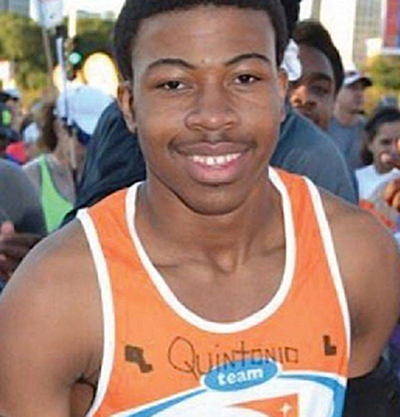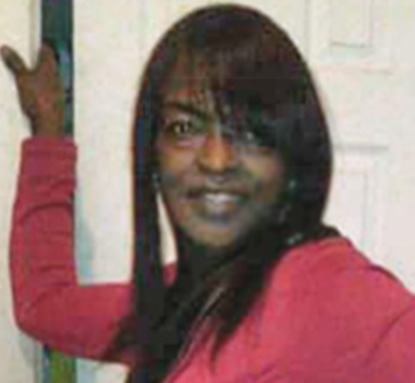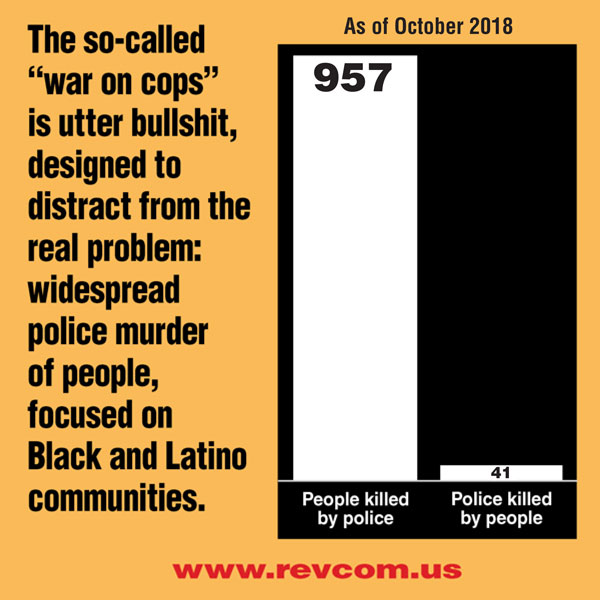Case #31: Double Murder by Police in Chicago—on the Night After Christmas
| Revolution Newspaper | revcom.us
Bob Avakian has written that one of three things that has "to happen in order for there to be real and lasting change for the better: People have to fully confront the actual history of this country and its role in the world up to today, and the terrible consequences of this." (See "3 Things that have to happen in order for there to be real and lasting change for the better.")
In that light, and in that spirit, "American Crime" is a regular feature of revcom.us. Each installment will focus on one of the 100 worst crimes committed by the U.S. rulers—out of countless bloody crimes they have carried out against people around the world, from the founding of the U.S. to the present day.
THE CRIME
On the night of December 26, 2015—the night after Christmas—Antonio LeGrier called 911 because his 19-year-old Black son, Quintonio, was struggling with mental health issues and his family wanted help. Antonio called Bettie Jones, a 55-year-old Black woman who lived downstairs, to alert her to his son’s situation and let her know to be on the lookout for the police.
Bettie’s daughter Latisha told reporters afterwards that her mother had gone to the door—presumably to let the cops in the building—and then Latisha heard shots. She rushed to the hall to find her mother and Quintonio lying there bleeding. As Latisha came to the doorway, the police threatened to shoot her as well. One bullet fired by the police went through the front door and through several rooms in Bettie Jones’ home.
According to the two cops, when they entered the lobby Quintonio was coming down the stairs from the second-story flat carrying an aluminum bat. The cops backed up, but Robert Rialmo—the cop who opened fire killing both Quintonio and Bettie—said Quintonio came at him swinging the bat, giving him no choice but to shoot Quintonio to save his own life. He claimed Bettie Jones was standing behind the youth and was shot “by accident.”
In a report issued in 2017, the Civilian Office of Police Accountability (COPA) revealed that the killer—Robert Rialmo—and his partner had lied about key details justifying these deaths. They concluded that Rialmo’s shooting of both LeGrier and Jones were unjustified. No, Quintonio was not swinging the bat that Rialmo claimed gave him no choice but to shoot the youth. In fact, when Rialmo’s partner was first interviewed, he never mentioned the bat being swung. Added to this, it was found that Rialmo was nowhere near Quintonio when he opened fire. Witnesses, shell casings, and other evidence showed that Rialmo was standing outside the building, halfway between the stoop and the sidewalk, when he fired into the lobby, killing both LeGrier and Jones.
Quintonio LeGrier had been shot seven times, and Bettie Jones three times, in a hail of police bullets inside the lobby of a two-flat (a two-unit apartment building) on Chicago’s West Side. It was Latisha, not the cops, who stayed with Quintonio and her mom, checking their pulse and making sure they were still breathing. It took the ambulance half an hour to arrive. Latisha said when they got there, the ambulance attendants “just dragged” her mother and Quintonio out of the house and down the steps to the waiting wheeled stretchers. Both Bettie and Quintonio died at the hospital.
Antonio LeGrier filed a wrongful death lawsuit two days after his son and Bettie LeGrier were shot and killed by police. No charges were brought by Chicago prosecutors against Rialmo for the killing of Quintonio LeGrier and Bettie Jones.
People in the neighborhood were furious and talked about how this happens way too often. One person commented, “They used to do it with a noose but now they do it with a gun and a badge.” One guy compared “how they do us” to slavery days. One of Quintonio’s friends at Northern Illinois University said, “Police are killing innocent children. People are being killed and it’s not right.” And Latisha said, “They tell me to be calm but there ain’t no being calm! They killed my mama!”
Quintonio LeGrier had graduated with honors from Gwendolyn Brooks College Preparatory Academy and was studying electrical engineering at Northern Illinois University. Friends remembered Quintonio as being especially good at math and how he helped them with their homework. He was always smiling and cracking jokes. Quintonio was an avid runner and was part of a team of students who ran the 2013 Chicago Marathon to raise money for clean drinking water for African children.
Bettie Jones had five children. Her niece described her as “a lively spirit” who loved Smokey Robinson and step dancing. She had been fighting ovarian cancer, and was working on the assembly line at Alpha Baking. Latisha and her mother had plans to have a mother-daughter day together before Bettie was murdered by the police.
A Crime on Top of a Crime
Two months after the double murder, in February 2016, the attorney for the killer cop Robert Rialmo filed a lawsuit against the estate of Quintonio LeGrier—on the grounds of “assault and emotional distress”—to the cop! He said in justification, “Something that bothers Officer Rialmo and myself about the way this is going is the family filed the lawsuit [for wrongful death] before the funeral. It seems like people believe now that if you have a family member killed by a police officer it’s the functional equivalent of winning the lottery.”
On top of this, in mid-December 2017, Chicago city attorneys went to federal court for permission to sue the LeGrier estate as well! According to their logic, Quintonio was responsible for Bettie Jones’ death as well as his own, so his estate should pay any damages the city owed to the Jones family. When word of this became public, there was such outrage the city quickly backtracked and stopped pursuing the suit. Quintonio’s mother said the city just keeps pouring salt into her wounds.
It was just two weeks later that COPA issued its report, described above, which revealed that Rialmo and his partner had lied about their lives being in danger to justify the killing of Quintonio and Bettie. The Chicago prosecutors had access to all of this evidence against Rialmo when they made their decision not to prosecute him. And there was no prosecution of Rialmo after the COPA report was released.
THE CRIMINALS
Robert Rialmo and his partner, Anthony LaPalermo. Rialmo was the cop who shot and killed Quintonio LeGrier and Bettie Jones, and LaPalermo backed up his lies to justify it.
Chicago Police Superintendent Eddie T. Johnson was Mayor Rahm Emanuel’s handpicked choice to be police superintendent. This was shortly before the double murder, amid the public outrage after the video of the police murder of Laquan McDonald was made public. Emanuel hoped that putting a Black cop in charge would quell criticism of the department, whose reputation for brutality is infamous. But Johnson disagreed with COPA’s recommendation that Rialmo be fired, saying his actions were “justified and within department policy.” This shouldn’t have been a surprise; Johnson’s record shows that he repeatedly approved police shootings, or ignored allegations of excessive force in case after case over years in positions of authority: Rekia Boyd, Dakota Bright, Niko Husband, Christian Green, and many more. And he has been involved in some of the most notorious recent police killings and scandals. Johnson came to Rialmo’s defense, calling for his exoneration despite the COPA report concluding that the killing was unjustified.
Chicago Police Department, or CPD—the second-largest police force in the country after New York’s—has a long and sordid history of shooting and murdering people with complete impunity. In 2017, the Department of Justice investigated the CPD after the uproar over McDonald’s murder and cover-up. They reported a police “pattern of unlawful force” and that “the failure to review and investigate officer use of force has helped create a culture in which officers expect to use force and not be questioned about the need for or propriety of that use.”
Mayor Rahm Emanuel and Chicago city government, over and over and over again, have protected the police, with prosecutors refusing repeatedly to charge cops for murdering Black and Latino youths, and pretending ignorance (really, ignore-ance) of the “code of silence,” which enables cops to cover for other cops who commit murder.
THE ALIBI
The excuse the cops used for this double murder was the one that is used over and over again—that they believed their lives were in danger. And despite the fact that in this case it was shown that their justification for these killings was based on lies, no charges were brought by the prosecutors. There is a constantly repeated refrain in this country: “Police officers stand as the thin blue line that protects society from evil and chaos.” From that perspective, if a disproportionate number of those killed by police are Black and Brown—Quintonio LeGrier and Bettie Jones, Rekia Boyd, Laquan McDonald, and hundreds more—and even if the killing is unjustified, people are trained to think: “Well, yes, that looks bad, but we have to keep in mind that the police have a difficult and dangerous job, and there are a lot of cops who are killed in the line of duty, too.”
THE REAL MOTIVE
The real motive behind this double murder, and the ongoing crimes of covering up and justifying the wanton police killing, predominately of Blacks, Latinos, and Native Americans, especially youths, goes to the actual role of the police in this society overall. As Bob Avakian has said:
The role of the police is not to serve and protect the people. It is to serve and protect the system that rules over the people. To enforce the relations of exploitation and oppression, the conditions of poverty, misery and degradation into which the system has cast people and is determined to keep people in. The law and order the police are about, with all of their brutality and murder, is the law and the order that enforces all this oppression and madness. (BAsics 1:24)
In this society, whose origins are rooted in slavery and genocide, white supremacy is sewn into its fabric. The wanton murders of the most oppressed in this society—the murders they carry out without being provoked—are an essential part of their job. Because the more arbitrary these murders seem, the more broadly they deliver the message that no one is safe, everyone among the oppressed and exploited in this society has a target on their back.
REPEAT OFFENDERS
The number of police shootings in Chicago has averaged one every week over years. Statistics compiled by the Guardian (UK) show there were 435 police shootings in Chicago from 2010 through 2015. Cops killed 92 people and wounded 170. The newspaper’s findings showed that about four out of every five people shot were African-American males.
Besides police murders, there have been repeated discoveries of organized operations by the police where torture and brutality were carried out systematically. In 2015, the Guardian wrote about the “black site” at Chicago’s Homan Square, supposedly a police-evidence storage facility, where people detained by the police, disproportionately Black and Latino, were taken “off the record.” (See “Homan Square: Chicago Police Dept.’s Continuing Criminal Enterprise” at revcom.us.) People were tortured, some forced to make false confessions. Many disappeared for days and lawyers and families could not find where they had been taken while police “questioned” them.
Before this there was the years-long Burge torture scandal. Under Chicago police commander Jon Burge, many people were subjected to unbelievable cruelty, including electric shocks to their genitals. Burge was protected from prosecution for this torture until the statute of limitations ran out—and then only did minor time for perjury. He collected a pension for the rest of his life, which funded his retirement in Florida. Other cops involved in the torture with Burge are still on the force.
Chicago is not the exception; rather it is a concentration of what continues to go on all over this country.

Quintonio LeGrier

Bettie Jones

The role of the police is not to serve and protect the people. It is to serve and protect the system that rules over the people. To enforce the relations of exploitation and oppression, the conditions of poverty, misery and degradation into which the system has cast people and is determined to keep people in. The law and order the police are about, with all of their brutality and murder, is the law and the order that enforces all this oppression and madness.
Bob Avakian, BAsics 1:24
“How Long?! How Many More Times Do The Tears Have To Flow?”
A clip from BA Speaks: REVOLUTION—NOTHING LESS!, a film of a talk by Bob Avakian given in 2012. Watch the whole talk at revolutiontalk.net.


